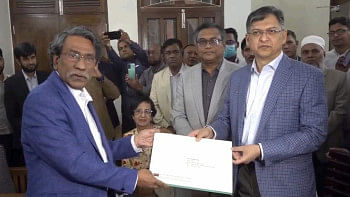The return of the intrepid patriarch

On January 10, 1972, history witnessed one of the momentous events of our political journey in the homecoming of Bengal's Braveheart. On this day, Bangabandhu Sheikh Mujibur Rahman, the architect of Bangladesh, returned, amidst a tumultuous welcome, to his native "Sonar Bangla". He returned to Dhaka where ten months ago he had issued a clarion call for independence, urging his people to go all out to achieve that goal.
Bangabandhu's homecoming to a victorious nation was extraordinary because despite his incarceration in Pakistani jail, the independence movement was carried out in his name and the armed struggle drew sustenance from his inspiring exhortations. Millions in occupied Bangladesh prayed for his safety while he was in prison. During Ramadan in 1971, scores of people fasted for his wellbeing, asking for providential intervention in special prayers. Such was their love for the leader whose supreme oratory electrified an entire population and galvanised a suffering polity into an armed resistance.
Oratory, let us remind ourselves, was not the only forte of Bangabandhu whose sacrifices and sufferings at the hands of an insensitive establishment endeared him to the grateful Bengalis. Quite clearly, here was a leader who, for the better part of his youth, went to prison for the cause of his people. While the people languished under dreadful circumstances, Bangabandhu's fortitude in solitary confinement thousands of miles away was exemplary. Throughout his life, he stood like a solid rock in the shifting sands. The admirable beacon of freedom that he was, Bangabandhu harboured a certain extravagance of objectives and thus wandered beyond the safe provisions of personal gratification.
Bangabandhu's homecoming also played a significant role in stabilising the national and international environment. On the international front, his presence expedited the huge economic assistance for a war-ravaged economy and according diplomatic recognition to the newly independent sovereign nation; on the national front, the herculean task of restoring public order was largely accomplished by Bangabandhu's deft handling of a very volatile scenario. Restoring public faith in the efficacy of the regulatory organs of the state was a huge responsibility.
If we look back now, we will see that in the 1960s, the Bengalis of erstwhile East Pakistan were subjected to the most humiliating treatment. It will be no exaggeration to say that they were experiencing the tribulations of a colonised people. In an atmosphere of all-pervasive fear and subjugation, it was Bangabandhu who confronted the mighty Field Marshal Ayub Khan and showed his guts by forcefully advocating the rights of fellow Bengalis. During the trial of the so-called Agartala Conspiracy Case in Dhaka Cantonment, Bangabandhu took to task the rogue Pakistani army personnel and cautioned them to behave. He did not agree to participate in the Round Table Conference as a prisoner. The 1960s were, in fact, a time when all Bengalis could justifiably take pride in their courageous conduct that drew sustenance from Bangabandhu's defiant disposition.
The modern generation needs to know that Bangabandhu was a real epitome of courage, both in the physical and moral sense. The historic Six Point Programme, an explicit embodiment of Bengali nationalism, was unveiled at Lahore, the heart of Punjab, by Bangabandhu. In Lahore, the bastion of the arrogant Punjabi establishment, Bangabandhu displayed admirable physical and moral courage during the course of a public meeting in 1970 that he was addressing.
It so happened that his speech was being purposely interrupted by some Muslim League-Jamaat hirelings. When these elements did not stop despite being cautioned, Bangabandhu shouted at them by threatening that he did not come to Lahore to seek votes as he had plenty of them in his own place—and that they either listen to him or disappear from the meeting area. No Bengali had ever publicly ventured to rebuke the power-obsessed Punjabis in such a manner.
History tells us that when Bangabandhu said this, it had an electrifying impact on the Bengalis whose spirit soared immeasurably in heightened expectations. Their support for their leader was total and unconditional, as evidenced in the historic landslide victory of the nationalist causes in the 1970 elections. When the time came for tough talk across the table, Bangabandhu did not wilt. In fact, the cabal of Pakistani army generals that accompanied General Yahya Khan for a meeting in March 1971 were awed and surprised by his forthright presentation.
It is also a fact that the post-partition scenario in Pakistan did not witness much of a change. The military-civil bureaucracy conspired with the business oligarchy and the landed gentry to protect their vested interests. People's emancipation did not figure seriously in the politicians' scheme of things. It was under such circumstances that Bangabandhu could galvanise a somnolent people into unprecedented political activism for achieving real freedom.
We also need to recognise that Bangabandhu was gifted with extraordinary organisational acumen. Accordingly, he prepared his party and the ordinary people for an imminent armed struggle. His historic March 7 speech bears eloquent testimony to that. During the extremely tumultuous days of March 1971, before the war broke out, Bangabandhu acted as a constitutional politician with supreme forbearance.
We need to appreciate that Bangabandhu could never be cowered into submission. The trappings of power did not attract him. It is time again for the nation to pay homage to their great patriarch.
Muhammad Nurul Huda is a former IGP.


 For all latest news, follow The Daily Star's Google News channel.
For all latest news, follow The Daily Star's Google News channel. 



Comments